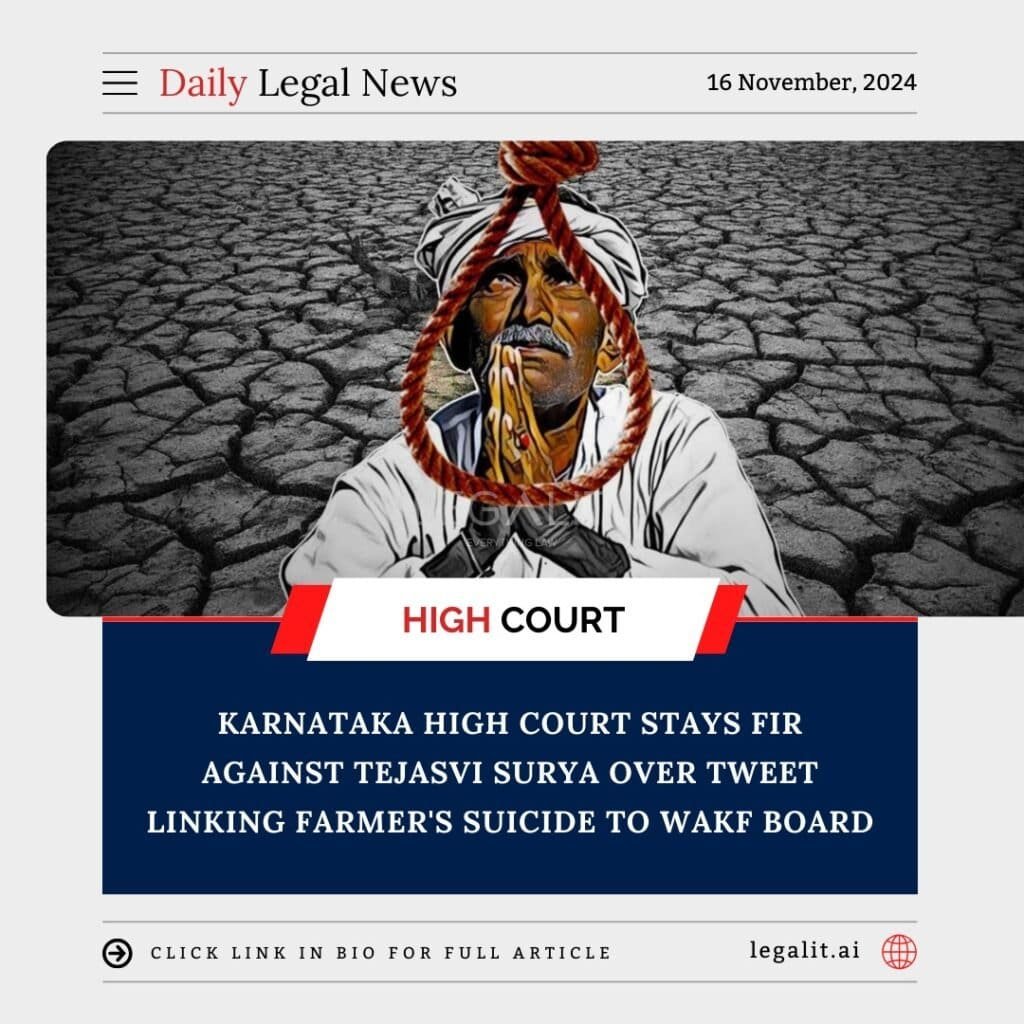
The Karnataka High Court has stayed the First Information Report (FIR) filed against Tejasvi Surya, Member of Parliament from the BJP, in connection with a tweet where he allegedly linked a farmer’s suicide to the Wakf Board. The case had sparked significant controversy, with Surya accused of spreading misinformation and defaming the Wakf Board, a government body managing religious endowments, by attributing the farmer’s suicide to them without any substantial evidence.
Background:
The FIR was lodged in response to a tweet made by Tejasvi Surya, in which he claimed that the farmer who died by suicide had done so due to alleged financial distress linked to the Wakf Board. Surya’s tweet stirred political and social debates, especially with some members of the opposition and social activists accusing him of making unfounded allegations that could harm the reputation of the Wakf Board and escalate communal tensions.
The complaint was filed by the Karnataka State Wakf Board, which took issue with Surya’s statement, claiming that it was defamatory and lacked factual support. Surya, on his part, defended the tweet, asserting that he was merely highlighting a broader issue and did not intend to defame anyone.
Following the registration of the FIR, Surya approached the Karnataka High Court, seeking a stay on the proceedings, arguing that the allegations against him were baseless and that the FIR infringed upon his right to free speech.
Court’s Rationale:
- Stay on FIR: The Karnataka High Court, after hearing the arguments, decided to grant a stay on the FIR, effectively halting further police action against Surya. The court’s decision is significant, as it allows Surya to continue his political and social activities without being subjected to immediate legal proceedings.
- Right to Free Speech: In granting the stay, the court appeared to acknowledge Surya’s defense of free speech, indicating that the legal proceedings could stifle legitimate expression, especially if the allegations against him were deemed to be without merit. However, the court also reserved the right to examine the matter in greater detail at a later date.
- Defamation and Misinformation: While the court stayed the FIR, it acknowledged the seriousness of the allegations of defamation and misinformation. The court made it clear that further legal scrutiny would be required to determine whether Surya’s tweet indeed amounted to defamatory action or whether it was protected under his right to free speech.
- Ongoing Legal Proceedings: The court’s stay on the FIR does not indicate a final judgment on the matter. The case will continue, and a more thorough examination of the facts, including the context of the tweet and the impact on the Wakf Board, will take place in due course.
Implications:
- Freedom of Expression vs. Defamation: This case raises important questions about the balance between freedom of speech and defamation. Political leaders and public figures often use social media to comment on public issues, but whether such statements can be held as defamatory is a matter of legal contention. This case may set a precedent for future social media defamation cases.
- Impact on Political Discourse: The case highlights the challenges of regulating political discourse in the age of social media. While the tweet in question may have been a statement of concern, its potential to harm reputations and inflame tensions raises legal issues about the responsibility of public figures in managing their communications.
- Legal Precedent for Defamation: If the case proceeds to trial, it could offer important insights into how courts handle defamation claims involving public figures and whether accusations without substantiated evidence can be legally pursued. The case may clarify the limits of free speech when making serious allegations, particularly in the context of social media.
Conclusion:
The Karnataka High Court’s stay on the FIR against Tejasvi Surya has temporarily shielded him from legal action, but the case continues to unfold and could have long-lasting effects on how defamation cases involving political discourse and social media statements are handled in India. The final judgment will likely provide clarity on the balance between freedom of speech and defamation in the context of public statements made by political figures.